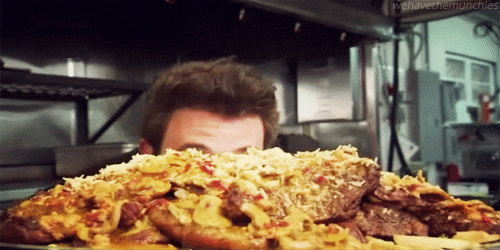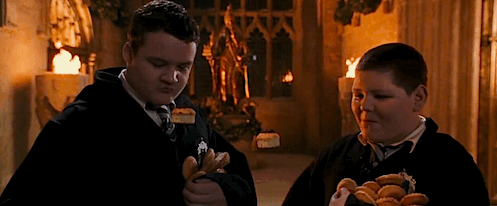Meal plans and buffet dining halls can both seem like blessings to a broke and hungry college student, but there’s a big chance that you’re eating more than you think within those walls. There are a number of psychological factors that play into our hunger and the motivation to eat, and buffets pretty much cover all the bases. This means that your favorite dining hall is likely a danger zone if you’re trying to watch how much you eat.
Palatability

GIF courtesy of imgur.com
This one is pretty self-explanatory, but it’s still important. We tend to eat more of something if it tastes good, as our brain tells our body to keep adding extra spoonfuls when the buffet halls have something that we literally can’t have enough of. While eating the amount you want is fun, it can disrupt your regular body functions, especially if it’s something that’s not very nutrient-rich.
Amount of food available

GIF courtesy of tumblr.com
Typically, this is a problem associated with having larger plates, but the same concept applies. The more food that’s readily available to us, the more we eat. Buffets continually replenish the supply of food that they’re serving, which means that the never-ending large quantities of food motivate us to eat more.
The same rule goes for having big plates: we fill it excessively, and we don’t register that the amount we’re eating is actually more than normal.
Variety

GIF courtesy of tumblr.com
At a buffet, there are 10 different entrees and 15 desserts to choose from, we’re more than likely going to want to try more than just one. Ultimately, having lots of food options translates into eating more, simply because we want to sample the sheer amount of choices.
If we stick to one food, we get tired of it more easily and we perceive our own satiety sooner. With more options, there’s multiple flavors for our mouth to process, taking a longer time before our body decides that we’re full.
Eating with others

GIF courtesy of tumblr.com
This one is dependent on who you eat with, but it happens often, especially if you’re dining with someone you don’t know as well. If your fellow diners are putting two helpings of mashed potatoes on their plate, chances are that you’ll do the same thing, thanks to what is known as social modeling. This can stem from a need to maintain a good impression of yourself, but it can also be just a need to follow suit and conform to what others are doing.
Keep these elements in mind the next time you’re in your favorite dining hall. This doesn’t mean that you should abandon the buffet altogether – just be more aware of the different psychological components that factor into your hunger. You’d be surprised to see how much of an influence they have.


